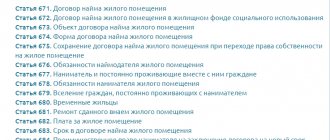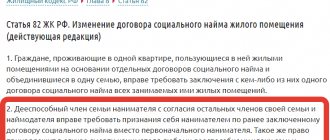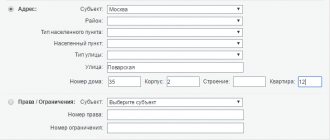Regulations
A person has the right to stand in line for municipal housing if he is low-income and needs his living conditions to improve .
Article 51 of the Code imposes certain restrictions in this case: the citizen does not own housing and does not rent it on social rent; family members are provided with an area less than the accounting norm; the apartment does not meet the requirements for premises intended for living; lives in a communal apartment, without other housing, on the same territory with a sick person, living together with whom is dangerous or unbearable, and this is confirmed by the health authority.
at the place of work as a basis for registration , but the Code contains a clause that allows legislation to establish a different procedure for the provision of living space.
Typically, an application for registration is submitted at the place of registration.
But this is not necessary: Article 52 of the Housing Code of the Russian Federation in some cases provides grounds for being registered in another locality if the work involves movement : military personnel, workers with 10 years of experience in underground work, etc.
Who is available for social hiring and under what conditions:
- for the poor;
- categories of citizens specified in the law of a specific subject of the Russian Federation;
- persons who arrived from abroad and do not have citizenship, if the basis is in an international agreement;
- orphans;
- retired military personnel;
- persons whose term of stay in places of imprisonment has ended;
- people living in premises deemed unsuitable for living even after renovation.
Social rent agreements are concluded on a first-come, first-served basis. The sooner a person registers, the faster he will receive living space; its provision is a free service.
Find out how to change the responsible tenant in a municipal apartment from our article.
If a citizen moves into municipal housing for social rent
In order for a citizen to view the property, the municipality gives him permission. If the citizen is satisfied with everything, then a social rental document for housing is concluded.
If there is an old warrant for an apartment in the USSR, then in order to register it you will not have to go to the administration. This document makes it possible to privatize real estate. In addition to this, you need to bring the following documents:
- citizen's passport;
- if there are children, you will have to provide their birth certificates;
- if a citizen has a wife, then he must provide a marriage certificate.
Grounds for refusal
Registration may be refused. The grounds and procedure for refusal are prescribed in Article 54 of the RF Housing Code:
- Documents confirming the status of those in need of housing were not presented.
- The citizen deliberately worsened his living conditions in order to obtain this status. Such citizens have the right to get on the waiting list for housing only after 5 years have passed after the crime.
You can find out about the grounds for eviction and relocation from an apartment received under social rent on our website.
Conditions for deregistration
Article 56 specifies cases when a person can be deregistered:
- Submitting an application from a citizen standing in line to receive an apartment about his desire to be deregistered.
- Loss of needy status: income has increased, etc.
- Moving to another locality (municipal entity).
- Obtaining a plot of land and funds from the budget to build a house.
- Detecting the illegality of a citizen’s registration (false information about income, etc.).
You can find out whether it is possible to exchange or rent out a municipal apartment from our articles.
If a citizen is placed in a cooperative apartment
If a warrant was used by a citizen to purchase such real estate, then it must be used correctly. This document does not indicate that the citizen has no claims against the developer. It is not possible to pay the share fee using it.
And a citizen receives rights only after full payment for the property. After the house is put into operation and occupied by residents, the cooperative can re-register it as a HOA. The office provides information and stores everything in the archive. It is now very common to purchase real estate through cooperatives.
Standards for required living space
The standard for providing space (see Article 54, Part 2, Housing Code of the Russian Federation) is the area of the premises per 1 person (minimum). It is determined by municipal authorities taking into account the level of provision of the population with living space. For example, in Moscow it is 18 square meters . In Rostov - from 15 to 18 (if family); 25 - 33 (if the tenant lives alone).
As an exception to the rules, the total area of a 1-room apartment (room) provided for social rent to one citizen can be twice the norm, if there is no other one that exactly corresponds to the standard footage.
Article 50 of the LC (Part 4) defines the accounting norm . This is the standard that is used to register those in need of housing. The accounting norm for living space per 1 co-tenant: 6 - 10 square meters . Its size is set by local governments; it should not be more than the provision norm.
Read about the grounds for terminating a social tenancy agreement for such premises on our website.
Social tenancy agreement
The subject of this agreement will be a separate living space, that is, isolated.
Attention! An isolated room, but not necessarily an apartment. The main thing is that the room is separate. Non-isolated premises, as well as common areas, cannot be provided for social rent.
Let us remind you that according to Art. 16 of the Housing Code of the Russian Federation, the following are considered residential premises:
- residential building or part thereof;
- apartment or part thereof;
- room.
For example, you can. The contract, in principle, is working, but all clauses should be carefully reviewed in order to adapt to your conditions. Changes are allowed, but no point should worsen the situation of the employer.
The contract must include two parties: “Tenant” - a citizen and “Lenter” - the municipality. Both parties sign the agreement and from that moment it comes into legal force.
The text of the contract specifies in detail what kind of housing is provided to the citizen for rent (apartment, house, apartment in a two-flat building, etc.). The address of the property is indicated: (region, district, locality, street, house number), in apartment buildings (building and floor).
The exact footage of the usable and total area of the room is prescribed. Sometimes, when the premises are furnished, a transfer and acceptance certificate is attached to the contract, which indicates all interior items, furniture, household appliances, etc. But more often, empty living space is rented out.
Please note that the clauses of the agreement may contain a definition of the possibility of termination of the agreement at the initiative of the “Lenter”. This is an important point, since inattention when reading the contract can result in forced eviction if this clause of the contract is not fulfilled.
As a rule, the true reasons for termination of the contract may be violations committed by the tenant, for example, using the housing for other purposes (cluttering, which entails the creation of a fire hazard, the proliferation of all kinds of insects and rodents). Violation of silence, petty hooliganism. Delay in payment for utilities and rent, more than six months.
Attention! The social tenancy agreement is terminated automatically in the event of the death of the main employer who signed the agreement.
The norm for the allocated area based on square meters, meters per family member is indicated in Art. 50 Housing Code of the Russian Federation. This norm can be reduced, but not by more than 10%. The parties, by agreement, may introduce important conditions into the contract. After signing the contract, civil legal relations arise between the parties, which in itself entails certain obligations between the parties.
Important! You should check that the terms of the contract are not specified. According to Article 60 of the Housing Code, it must be of unlimited duration.
The agreement is concluded in two copies, one for each party.
Required documents
What documents need to be collected and submitted for priority?
The application can be submitted on the State Services website, taken personally to the MFC, or assigned to your legal representative to do this.
The ways to get the result are the same.
In addition to the application, you must submit documents that confirm your right to be registered as needing housing. In addition to the available documents, or if they are not available, the MFC will make interdepartmental requests to obtain the necessary information confirming your status.
The decision on this issue is made by the body that carries out registration. The period for consideration of the application is one month from the moment it is submitted to this authority directly by you or a representative of the MFC.
You will receive it in writing at the MFC within three days from the moment the decision is made. It is also possible to receive the document by mail or from the registration authority.
The procedure for registering citizens in need of housing is determined by the law of a specific subject of the Russian Federation.
Find out how a social tenancy agreement differs from a rental agreement for specialized residential premises, as well as the concept of commercial rental of residential premises, from our articles.
What order is called temporary?
Typically, this document has a validity period and can be no more than 30 calendar days. Usually it was given so that a citizen could move in, for example, at the time of training or a business trip.
Typically, a service warrant had the same rights. But it was different in that such real estate was classified as departmental. As a rule, it was owned by enterprises, scientific institutes or other organizations. And it was given only for the time the citizen held an official position or performed any duties. And the document is valid for no more than five calendar days.
Extraordinary and preferential
Citizens can receive it out of turn
- suffering from a chronic disease that occurs in a severe form;
- disabled people (Group I) who participated in hostilities;
- judges;
- disabled and elderly people, subject to their refusal from the services of a stationary organization providing social services, if the housing they occupied before moving to a social institution cannot be returned to them;
- parents or legal representatives of children infected with HIV, provided they live together with a minor with HIV;
- rehabilitated;
- parent-educators who organized a family orphanage must receive a cottage or multi-room apartment under a social tenancy agreement;
- disabled children brought up in a stationary social care organization. services, at the age of 18, if they can provide self-care and live independently.
The Housing Code of the Russian Federation has canceled the preferential provision of residential premises on social terms. hiring This is only possible in two cases:
- for categories of citizens designated in the 2nd part of Article 57 of the RF Housing Code, dedicated to the extraordinary provision of apartments and houses;
- when special housing is provided to those in need (the poor do not belong to this category).
The principles according to which social housing are contained in the Housing Code of the Russian Federation. Compared to the Housing Code of the RSFSR, it does not provide grounds for providing apartments in order of priority to large families, disabled workers, when twins appear in the family, rescuers and other citizens, the list of categories of which was previously in Article 36 of the Housing Code of the RSFSR.
If you find an error, please select a piece of text and press Ctrl+Enter.
Registration of privatization
After completing the contract, submit an application to the organization dealing with privatization issues at your place of residence.
The application will need to be accompanied :
- personal documents of those registered in the apartment;
- applications from all those registered, including minors (from children under 14 years old, the application is submitted by parents, from 14 to 18 years old - the child fills out the document independently);
- a certificate of registration (or an extract from the house register);
- rental agreement;
- technical passport and floor plan drawn up in the BTI;
- cadastral passport of the object;
- extract from the Unified State Register from Rosreestr;
- a certificate of non-use of the right to privatization for each applicant (read about the right to re-privatization);
This package of documents and application can be submitted through the MFC.
After reviewing the documents and making a decision, a privatization agreement will be concluded with you, on the basis of which you will be able to obtain a Certificate of Ownership of the apartment from Rosreestr.
Timing and cost
It will take up to 30 days to draw up a rental agreement, after providing a warrant or coupon for it . It all depends on the efficiency and responsibility of the employees performing the work. The further procedure will take about two months.
According to the Administrative Regulations (clause 2.7.1), 46 working days are allotted .
When registering, you will need to pay a state fee :
- Technical passport and floor plan in BTI - from 1000 rubles.
- The state fee for registering a right in Rosreestr is 500 rubles.
- Notarized refusal of privatization – 500 rubles.
- Extract from the Unified State Register – 500 rub.
- Certificate of non-participation in privatization – 200 rubles. per person.
- The state fee for the Certificate is 2000 rubles. from each owner.
In total, it will take about 5 thousand rubles .









